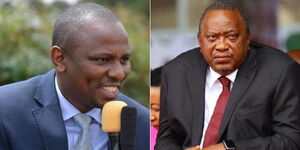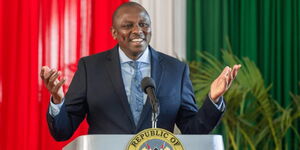President Uhuru Kenyatta has time and again defended his decision to borrow more stating that the funds would be integral in funding his pet projects, identified as the Big 4 Agenda.
On Wednesday, October 9, the Members of the National Assembly gave a huge boost to the President's agenda after they approved his request to raise the debt ceiling, allowing the government to borrow up to Ksh9 trillion to fund his agenda.
This, however, according to an economist and senior advisor at the Saudi Arabian Monetary Authority Mohammed Welihye, did not start with the President's request to the National Assembly.
In an opinion piece penned on the Daily Nation on Tuesday, October 9, Welihye noted that the Big 4 Agenda was going to be an expensive process that would require a huge chunk of the budget.
He noted that the Members of Parliament were convinced to pass the 2019/2020 budget with the condition that the Ksh635 billion deficit would be funded through additional borrowing.
With the country's debt level at close to Ksh5.9 trillion and a borrowing cap of Ksh6 trillion in place, the MPs were forced to raise the ceiling in order to accommodate the deficit, failure to which the government would have shut down at both the county and national level.
A government shutdown happens when non-essential government offices can no longer remain open due to a lack of funding. The lack of funding usually occurs when there is a delay in the approval of the government's funds for the upcoming financial year.
The shutdown remains in effect until parties can reach a compromise and a budget bill passes. During a government shutdown, many federally run operations will halt.
Welihye noted that the situation could have been avoided if the members of the National Assembly had played their debt management oversight role more effectively.
"How on earth, for example, did the National Assembly approve a fiscal framework with deficits in current and subsequent years when they already knew that the public debt had hit the ceiling?" he pondered.
He clarified that the fiscal deficit was the key driver of public borrowing, a situation that he stated should be addressed, failure to which the government would breach the Ksh9 trillion ceiling in less than two years.












